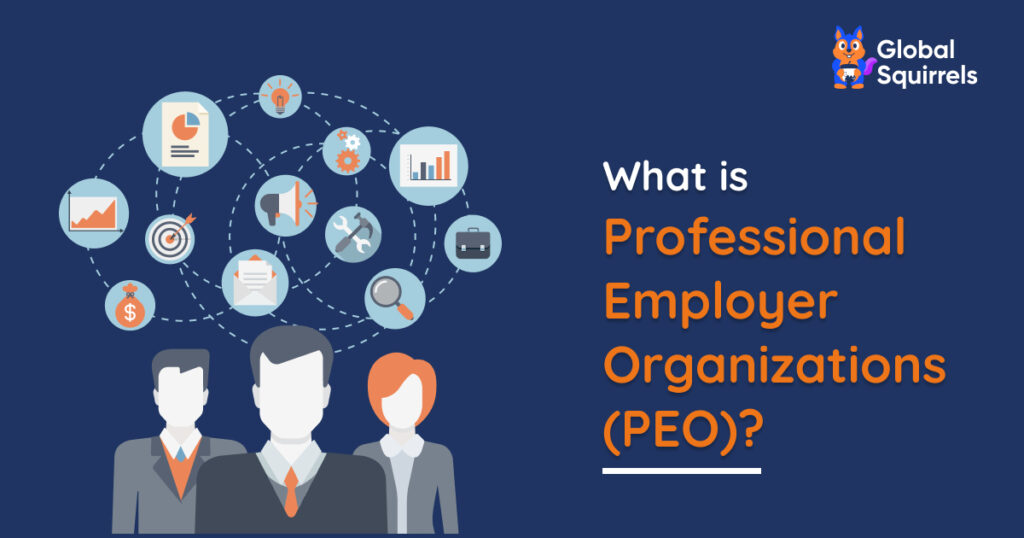What is PEO? – Role and Benefits

As the business world continues to grow in complexity, PEOs have become the strategic allies that empower companies to thrive by outsourcing HR tasks, reducing overhead, and fostering workforce productivity. Professional Employer Organization PEO service is essentially a strategic outsourcing partner that provides comprehensive HR services to companies. These services include handling payroll, benefits administration, compliance with labor laws, and much more.
In this blog, we’ll delve into the fundamentals of PEOs, demystify their role in today’s business landscape, and explore the numerous advantages they bring to both small and large enterprises.
What is PEO?
PEO stands for Professional Employer Organization. It is a strategic outsourcing partner that provides comprehensive HR solutions, including payroll administration, benefits management, compliance assistance, and other HR-related tasks. This arrangement allows businesses to offload non-core functions and administrative burdens, enabling them to concentrate on their primary objectives, growth strategies, and innovation.
Understanding the concept of a professional employer organization is vital for businesses aiming to optimize their operations. By collaborating with a PEO service provider, companies can access a range of benefits.
First and foremost, PEOs often have expertise in HR and employment regulations, which can help businesses navigate complex legal requirements and maintain compliance. This is particularly crucial as labor laws and regulations can vary significantly from one jurisdiction to another.
Moreover, Professional Employer Organizations often offer economies of scale when it comes to employee benefits and insurance. By pooling the employees of multiple client companies, PEOs can negotiate better rates for health insurance, retirement plans, and other benefits, which can translate into cost savings for individual businesses.
Furthermore, the administrative burden associated with payroll processing, tax filings, and HR paperwork is alleviated when partnering with a PEO. This enables businesses to focus on strategic initiatives and core competencies that drive growth, rather than getting bogged down in administrative tasks.
Importance of a professional employer organization (PEO) for businesses?
The relationship between a business and a professional employer organization is characterized by a co-employment arrangement. In this partnership, the PEO becomes the employer of record for certain HR-related purposes, while the client company retains control over the day-to-day operations and management of its employees.
This partnership dynamic allows for a shared responsibility approach, where the service provider and the business collaborate to ensure that HR and administrative tasks are handled efficiently and in compliance with regulations.
If you’re a small business owner, you can learn more about the specific advantages PEOs offer to small businesses in our dedicated blog.
Roles of Professional Employer Organization PEO in different segments
1. Managing HR and administrative tasks
It plays a pivotal role in handling a range of HR and administrative tasks on behalf of client companies. These tasks often include payroll processing, tax filings, employee benefits administration, workers’ compensation, risk management, compliance with employment laws, and more. By outsourcing these functions to a PEO service provider, businesses can tap into the expertise and resources of the PEO to effectively manage these complex and time-consuming responsibilities.
2. Operational model of PEOs
PEOs function by entering into a contractual agreement with client companies. Under this agreement, the PEO becomes the co-employer of the client’s workforce for specific purposes. This co-employment relationship is essential for enabling the PEO to provide services related to HR, benefits, and compliance. It’s important to note that the client company maintains operational control over its employees, including job responsibilities, performance management, and day-to-day tasks.
3. Shared responsibilities as co-employers
As co-employers, PEOs share certain responsibilities with client companies. While the client company retains control over the direction of its business, PEOs take on critical HR-related tasks. These include managing payroll and tax-related obligations, providing access to employee benefits such as health insurance and retirement plans, ensuring compliance with labor laws and regulations, and handling workers’ compensation claims and risk management. This shared responsibility model allows businesses to tap into the expertise of the PEO and ensure that HR functions are executed accurately and efficiently.
4. Allow focus on core operations
By entrusting HR and administrative tasks to a PEO, businesses can shift their focus to their core operations, growth strategies, and innovation. This arrangement allows business owners and managers to dedicate more time and resources to activities that directly contribute to their company’s success, rather than being weighed down by administrative complexities.
Above above-discussed things essentially answer the question, what does PEO stand for? Let’s discuss further on the question, what is a professional employer organization for businesses?
Key benefits of PEO
1. Simplified HR management
PEOs play a critical role in streamlining various aspects of HR management for businesses.
Employee recruitment, onboarding, and training
PEOs assist in the recruitment process by leveraging their expertise to identify suitable candidates. They also handle onboarding tasks, ensuring that new employees are smoothly integrated into the company’s culture and operations. Additionally, PEOs often provide training resources to enhance employee skill sets, fostering professional growth.
HR-related legal compliance
PEOs specialize in HR-related legal matters, staying up-to-date with ever-changing labor laws and regulations. This expertise ensures that businesses remain compliant with employment laws, reducing the risk of legal issues and penalties.
2. Comprehensive payroll services
PEOs offer comprehensive payroll services that alleviate the burden of payroll processing and tax administration
Payroll processing and tax administration
PEOs manage payroll tasks, including calculating wages, deductions, and taxes. This ensures accurate and timely payment to employees, reducing the likelihood of errors and ensuring compliance with tax regulations.
3. Access to employee benefits
PEOs provide businesses with access to attractive employee benefit packages –
Cost-effective employee benefits
PEOs pool together employees from multiple client companies, enabling them to negotiate more favorable rates for benefits such as health insurance, retirement plans, and more. This empowers businesses to offer competitive benefits without the substantial costs associated with administering them independently.
Leveraging a larger employee pool
PEOs’ larger combined workforce allows them to secure better insurance rates and benefits options from providers, extending these advantages to their client companies.
4. Ensuring legal compliance
PEOs offer a shield of legal compliance for businesses –
Staying current with labor laws
PEOs are well-versed in labor laws and regulations, helping businesses adapt to changes and maintain compliance. This proactive approach reduces the risk of non-compliance and potential legal liabilities.
Risk reduction through compliance
By adhering to legal requirements, PEOs help businesses avoid penalties, lawsuits, and other costly consequences associated with HR-related legal violations.
Industries that benefit from PEO
1. Small and medium-sized enterprises (SMEs)
Empowering SMEs: PEOs enable small and medium-sized businesses to compete with larger corporations by providing access to professional HR services and benefits that might otherwise be challenging to afford independently.
Flexibility and scalability: PEOs offer the flexibility to scale HR services up or down as a business grows or changes, allowing SMEs to adapt without the constraints of managing HR in-house.
2. Businesses expanding to new locations
Navigating unfamiliar labor laws: PEOs are invaluable when expanding to new locations, as they possess expertise in the labor laws and regulations of various regions. This expertise helps businesses navigate unfamiliar legal terrain.
Support in the establishment: PEOs offer support during the process of establishing operations in new regions, including assistance with compliance, recruitment, and other HR-related tasks, ensuring a smooth transition.
We discussed what is a professional employer organization is for businesses, the importance of using a PEO, and the benefits of partnering with a PEO platform. Let’s shed some light on how to choose the right PEO for your business.
How to choose the right PEO Partner?
In the complex landscape of modern business, partnering with a Professional Employer Organization (PEO) can provide your company with a competitive edge by streamlining HR and administrative tasks. However, finding the right PEO for your needs requires careful consideration of various factors. Here’s a guide to help you make an informed decision –
Factors to consider
PEO’s track record and reputation: Research the PEO’s history and reputation within the industry. Read reviews, testimonials, and case studies to gauge the experiences of other businesses that have partnered with them.
Services offered and customization options: Assess the range of services the PEO offers. Look for a PEO that provides the specific services your business requires, whether it’s payroll, benefits administration, compliance assistance, or more. Additionally, consider their ability to tailor their offerings to meet your unique needs.
Check out our expert guide on how to choose the best global PEO or EOR partner.
Industry expertise and specialization: Look for a PEO with experience and expertise in your industry. Industry-specific knowledge ensures that the PEO understands the unique challenges and compliance requirements your business faces.
Evaluating business needs
Alignment with business requirements: Choose a PEO whose services align with your business’s requirements. A tailored approach ensures that you receive the support you need without unnecessary expenses on services you don’t require.
If you’re ready to streamline HR and focus on growing your business, explore our full PEO service offerings here
Anticipating future growth: Consider your business’s growth trajectory. A PEO that can scale its services to accommodate your evolving needs is invaluable. This prevents the need to switch providers as your business expands.
Conclusion
In the ever-evolving realm of business, the symbiotic relationship between efficient workforce management and the Professional Employer Organization stands out as a paramount solution. This collaboration not only streamlines HR and administrative tasks but also ensures compliance with complex regulations.
By comprehending the PEO concept and its multifaceted role, businesses can simplify HR management, access comprehensive payroll services, provide appealing employee benefits, and maintain legal adherence.
Embracing a PEO partnership underscores a strategic path toward heightened operational efficiency, sustained growth, and transformative success.
